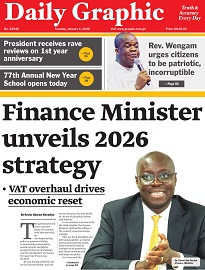Journalists must pursue public good — Otumfuo
The Asantehene, Otumfuo Osei Tutu II, has called on the media to use their professional power to pursue public good and development but not to abuse and vilify people.
For the media to thrive in a competitive environment, he said, the public would look out for media content that enhanced and promoted their quality of life and not trivial issues.
Towards that end, he said, the pursuit of professionalism would be rewarded but the “shelf-life of the arrogant and untutored will be short”.
He said the public was discerning and applauded good quality, saying, “We also see through the uninformed and untutored, and observe the arrogance and pomposity of those who see their media opportunity as conferring on them unbridled power to abuse and vilify.”
“For, in this competitive environment, the public will be the judge and they will judge with their wallets,” he stated.
The Asantehene said this when he addressed the 19th edition of the Ghana Journalists Association (GJA) awards in Accra last Saturday. It was on the theme, “Using development journalism to discern and defend the national interest.”
Graphic stands out
Ms Mabel Aku Baneseh of the Daily Graphic was crowned as Journalist of the Year. Six other journalists of the Graphic Communications Group Limited also won awards. They are Maxwell Akalaare, Oil and Gas and Features (print); Kofi Yeboah, Education and Water Reporting; Moses Dotsey Aklorbortu, Small and Medium Enterprises; Seth J. Bokpe, Rural Reporting, and a joint award in Telecommunication for Seth J. Bokpe, Nana Konadu Agyeman and Akwasi Ampratwum-Mensah; Rebecca Kwei (The Mirror), Millennium Development Goals (MDGs), and Samuel Tei Adano, Photojournalism.
Otumfuo Osei Tutu also entreated the media to make use of available expertise of Ghanaians on national issues rather than depend on politicians. The interests of democracy, he said, would be better served when the media loosened its ties with political parties and attracted more independent-minded expertise.
Ghana, he said, “has an ‘accumulated body of experts’ who have handled the economy from the first to the fourth Republic and who have insight that the country could benefit from”.
Despair
“I despair when you assemble a panel of political party communicators with no background in finance or banking or business to discuss critical issues of finance and the national currency,” he said.
The Asantehene said it was offensive when the media engaged panellists who spoke on all matters of national interest through politically tainted viewpoints.
Make use of available expertise
“Make the most of the available expertise and the country will be better for it,” he urged.
In so doing, he said, the cedi was very crucial to the stability of the national economy and that it was imperative to remove discussions on its state from the realm of partisan politics and rather place it as an issue of high national interest.
That, he said, should engender an effort to insulate the cedi from political and other pressures that were likely to undermine confidence in the currency.
Ghana, he said, was passing through difficult times and “the fact that we may have been through a similar or even worse experience before can be no comfort”.
What mattered, he said, was to fix the problem, and the greatest responsibility was on the leadership of the country.
Looking up to President Mahama
“We must look to the leadership of the state for solutions. The solutions, I have to say, lie in the bosom of one man and only he can provide the answers. So I say unto the President of the Republic, in the seminal words of the Methodist hymn: ‘Master speak Thy servant heareth’,” he stated.
He called for a speedy response from the President and expressed the hope that Ghanaians would not have to wait too long for that.
Pervasive corruption
Otumfuo Osei Tutu II also decried the pervasive nature of corruption in the country and said the media must be prepared to take some tough measures to address it.
“First, the media sector will do well to embrace some major structural changes to improve their viability and lessen their vulnerability to extraneous pressures,” he said.
Corruption, he said, was destroying businesses, undermining national governance, frustrating individuals and eroding international confidence in the country.
“We must accept that it is part of the problems afflicting the economy today and while we ponder over policy options, we must cry out for some act of courage to tackle the scourge of corruption, not on the peripheries but at the top,” he stated.
The Asantehene also called for a national emergency for a clean environment that would bring together the local, health and education authorities, as well as traditional rulers, to find practical ways of saving the country from the health hazards brought about by insanitary conditions.
Sustain change
While commending the media for being a positive partner for change, the Asantehene noted that the media had not established the same credit when it came to sustaining change and building an enduring foundation for the nation.
“It seems we have been so besotted with the notion of change that no sooner have we effected one than we begin casting our eyes around for the next one. In effect, we have become change hunters rather than nation builders,” he said.
People-centred development
President John Mahama, in a speech read on his behalf by the Minister of Communications, Dr Edward Omane-Boamah, said the pursuit of people-centred development remained crucial on the government’s agenda.
While commending the media for providing the platform for Ghanaians to appreciate efforts being made by the government, the President decried the use of social media in carrying out bad reportage that did not engender public good.
He called on the media and Ghanaians to reach into their hearts and tap into its inherent righteousness towards national development.
Writer’s email: victor.kwawukume@graphic.com.gh

